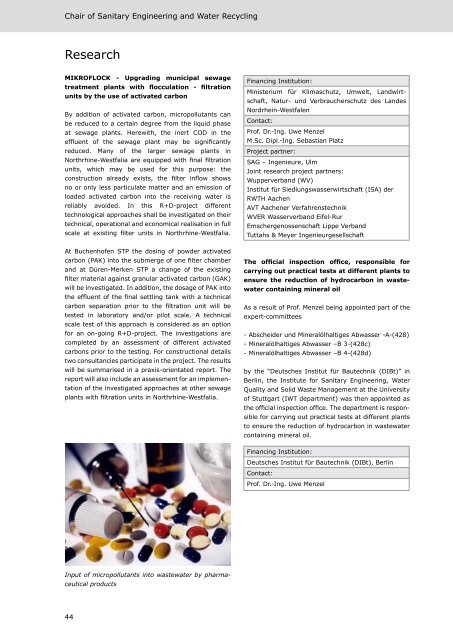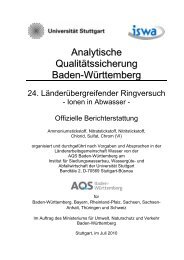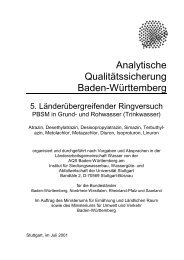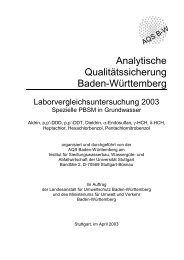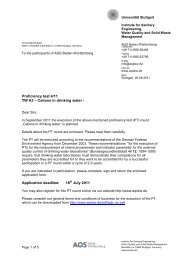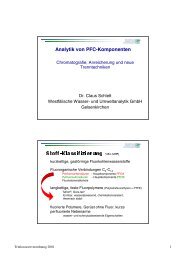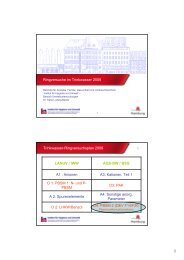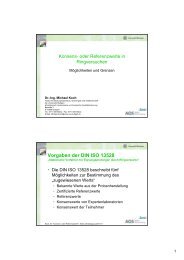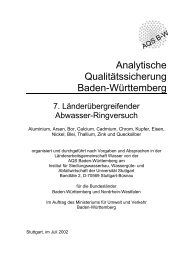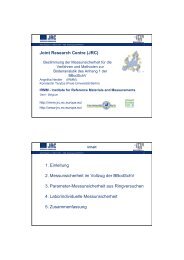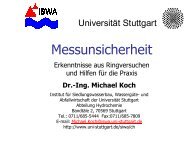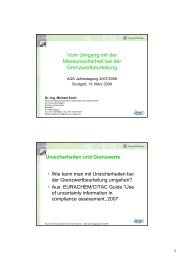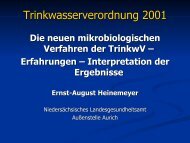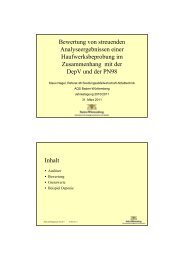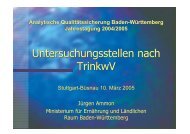Download - Institut für Siedlungswasserbau, Wassergüte- und ...
Download - Institut für Siedlungswasserbau, Wassergüte- und ...
Download - Institut für Siedlungswasserbau, Wassergüte- und ...
Create successful ePaper yourself
Turn your PDF publications into a flip-book with our unique Google optimized e-Paper software.
Chair of Sanitary Engineering and Water Recycling<br />
Research<br />
MIKROFLOCK - Upgrading municipal sewage<br />
treatment plants with flocculation - filtration<br />
units by the use of activated carbon<br />
By addition of activated carbon, micropollutants can<br />
be reduced to a certain degree from the liquid phase<br />
at sewage plants. Herewith, the inert COD in the<br />
effluent of the sewage plant may be significantly<br />
reduced. Many of the larger sewage plants in<br />
Northrhine-Westfalia are equipped with final filtration<br />
units, which may be used for this purpose: the<br />
construction already exists, the filter inflow shows<br />
no or only less particulate matter and an emission of<br />
loaded activated carbon into the receiving water is<br />
reliably avoided. In this R+D-project different<br />
technological approaches shall be investigated on their<br />
technical, operational and economical realisation in full<br />
scale at existing filter units in Northrhine-Westfalia.<br />
At Buchenhofen STP the dosing of powder activated<br />
carbon (PAK) into the submerge of one filter chamber<br />
and at Düren-Merken STP a change of the existing<br />
filter material against granular activated carbon (GAK)<br />
will be investigated. In addition, the dosage of PAK into<br />
the effluent of the final settling tank with a technical<br />
carbon separation prior to the filtration unit will be<br />
tested in laboratory and/or pilot scale. A technical<br />
scale test of this approach is considered as an option<br />
for an on-going R+D-project. The investigations are<br />
completed by an assessment of different activated<br />
carbons prior to the testing. For constructional details<br />
two consultancies participate in the project. The results<br />
will be summarised in a praxis-orientated report. The<br />
report will also include an assessment for an implementation<br />
of the investigated approaches at other sewage<br />
plants with filtration units in Northrhine-Westfalia.<br />
Financing <strong>Institut</strong>ion:<br />
Ministerium für Klimaschutz, Umwelt, Landwirtschaft,<br />
Natur- <strong>und</strong> Verbraucherschutz des Landes<br />
Nordrhein-Westfalen<br />
Contact:<br />
Prof. Dr.-Ing. Uwe Menzel<br />
M.Sc. Dipl.-Ing. Sebastian Platz<br />
Project partner:<br />
SAG – Ingenieure, Ulm<br />
Joint research project partners:<br />
Wupperverband (WV)<br />
<strong>Institut</strong> für Siedlungswasserwirtschaft (ISA) der<br />
RWTH Aachen<br />
AVT Aachener Verfahrenstechnik<br />
WVER Wasserverband Eifel-Rur<br />
Emschergenossenschaft Lippe Verband<br />
Tuttahs & Meyer Ingenieurgesellschaft<br />
The official inspection office, responsible for<br />
carrying out practical tests at different plants to<br />
ensure the reduction of hydrocarbon in wastewater<br />
containing mineral oil<br />
As a result of Prof. Menzel being appointed part of the<br />
expert-committees<br />
- Abscheider <strong>und</strong> Mineralölhaltiges Abwasser -A-(428)<br />
- Mineralölhaltiges Abwasser –B 3-(428c)<br />
- Mineralölhaltiges Abwasser –B 4-(428d)<br />
by the “Deutsches <strong>Institut</strong> für Bautechnik (DIBt)” in<br />
Berlin, the <strong>Institut</strong>e for Sanitary Engineering, Water<br />
Quality and Solid Waste Management at the University<br />
of Stuttgart (IWT department) was then appointed as<br />
the official inspection office. The department is responsible<br />
for carrying out practical tests at different plants<br />
to ensure the reduction of hydrocarbon in wastewater<br />
containing mineral oil.<br />
Financing <strong>Institut</strong>ion:<br />
Deutsches <strong>Institut</strong> für Bautechnik (DIBt), Berlin<br />
Contact:<br />
Prof. Dr.-Ing. Uwe Menzel<br />
Input of micropollutants into wastewater by pharmaceutical<br />
products<br />
44


